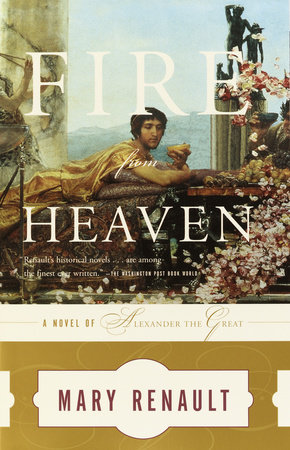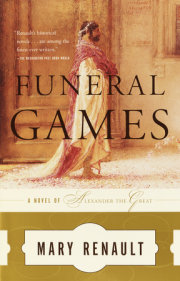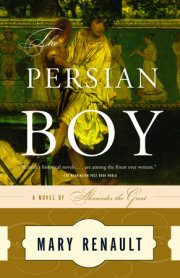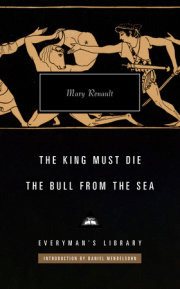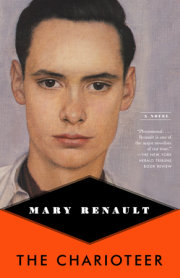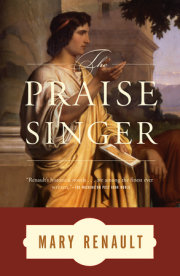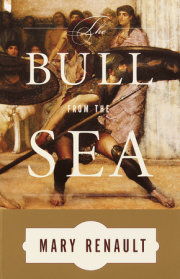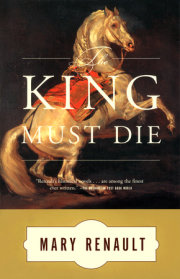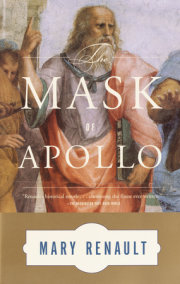1
THE CHILD was wakened by the knotting of the snake's coils about his waist. For a moment he was frightened; it had squeezed his breathing, and given him a bad dream. But as soon as he was awake, he knew what it was, and pushed his two hands inside the coil. It shifted; the strong band under his back bunched tightly, then grew thin. The head slid up his shoulder along his neck, and he felt close to his ear the flickering tongue.
The old-fashioned nursery lamp, painted with boys bowling hoops and watching cockfights, burned low on its stand. The dusk had died in which he had fallen asleep; only a cold sharp moonlight struck down through the tall window, patching the yellow marble floor with blue. He pushed down his blanket to see the snake, and make sure it was the right one. His mother had told him that the patterned ones, with backs like woven border-work, must always be let alone. But all was well; it was the pale brown one with the grey belly, smooth as polished enamel.
When he turned four, nearly a year ago, he had been given a boy's bed five feet long; but the legs were short in case he fell, and the snake had not had far to climb. Everyone else in the room was fast asleep; his sister Kleopatra in her cradle beside the Spartan nurse; nearer, in a better bed of carved pearwood, his own nurse Hellanike. It must be the middle of the night; but he could still hear the men in Hall, singing together. The sound was loud and discordant, slurring the ends of the lines. He had learned already to understand the cause.
The snake was a secret, his alone in the night. Even Lanike, so near by, had not discerned their silent greetings. She was safely snoring. He had been slapped for likening the sound to a mason's saw. Lanike was not a common nurse, but a lady of the royal kindred, who reminded him twice a day that she would not be doing this for anyone less than his father's son.
The snores, the distant singing, were sounds of solitude. The only waking presences were himself and the snake, and the sentry pacing the passage, the click of his armor buckles just heard as he passed the door.
The child turned on his side, stroking the snake, feeling its polished strength slide through his fingers over his naked skin. It had laid its flat head upon his heart, as if to listen. It had been cold at first, which had helped to wake him. Now it was taking warmth from him, and growing lazy. It was going to sleep, and might stay till morning. What would Lanike say when she found it? He stifled his laughter, lest it should be shaken and go away. He had never known it stray so far from his mother's room.
He listened to hear if she had sent her women out in search of it. Its name was Glaukos. But he could only hear two men shouting at each other in Hall; then the voice of his father, the loudest, shouting them both down.
He pictured her, in the white wool robe with yellow borders she wore after the bath, her hair loose on it, the lamp glowing red through her shielding hand, softly calling "Glaukos-s!" or perhaps playing snake-music on her tiny bone flute. The women would be looking everywhere, among the stands for the combs and paintpots, inside the bronze-bound clothes chests smelling of cassia; he had seen such a search for a lost earring. They would get scared and clumsy, and she would be angry. Hearing the noise from Hall again, he remembered his father did not like Glaukos, and would be glad that he was lost.
It was then he resolved to bring him back to her now, himself.
This must be done, then. The child stood in the blue moonlight on the yellow floor, the snake wound round him, supported in his arms. It must not be disturbed by dressing; but he took his shoulder-cloak from the stool, and wrapped it around both of them, to keep it warm.
He paused for thought. He had two soldiers to pass. Even if both turned out to be friends, at this hour they would stop him. He listened to the one outside. The passage had a bend in it, and a strongroom was round the corner. The sentry looked after both doors.
The footfalls were receding. He got the door unlatched, and looked out to plan his way. A bronze Apollo stood in the angle of the wall, on a plinth of green marble. He was still small enough to squeeze behind it. When the sentry had passed the other way, he ran. The rest was easy, till he got to the small court from which rose the stair to the royal bedchamber.
The steps went up between walls painted with trees and birds. There was a little landing at the top, and the polished door with its great ring handle in a lion's mouth. The marble treads were still scarcely worn. There had been nothing but a small harbor town on the lagoon at Pella, before King Archelaos' day. Now it was a city, with temples and big houses; on a gentle rise, Archelaos had built his famous palace, a wonder to all Greece. It was too famous ever to have been changed; everything was splendid, in a fashion fifty years old. Zeuxis had spent years painting the walls.
At the stair-foot stood the second sentry, the royal bodyguard. Tonight it was Agis. He was standing easy, leaning on his spear. The child, peeping from the dark side-passage, drew back, watching and waiting.
Agis was about twenty, a lord's son of the royal demesne. He had on his parade armor, to wait upon the King. His helmet had a crest of red and white horsehair, and its hinged cheek-flaps were embossed with lions. His shield was elegantly painted with a striding boar; it hung upon his shoulder, not to be put down till the King was safe in bed, and then not out of arm-reach. In his right hand was a seven-foot spear.
The child gazed with delight, feeling within his cloak the snake softly stir and twine. He knew the young man well; he would have liked to jump out with a whoop, making him throw up his shield and point his spear; to be tossed up on his shoulder, in reach of the tall crest. But Agis was on duty. It would be he who would scratch upon the door, and hand Glaukos to a waiting-woman; for himself there would be Lanike and bed. He had tried before to get in at night, though never so late as this; they always told him nobody could enter except the King.
The floor of the passage was made of pebble mosaic, checkered black and white. His feet grew sore from standing, and the night chill came on. Agis had been posted to watch the stairs, and only that. It was a different matter from the other guard.
For a moment he considered coming out, having a talk with Agis, and going back. But the slither of the snake against his breast reminded him he had set out to see his mother. That, therefore, was what he was going to do.
If one kept one's mind upon what one wanted, the chance appeared. Glaukos, too, was magical. He stroked the snake's thinned neck, saying voicelessly, "Agathodaimon, Sabazeus-Zagreus, send him away, come, come." He added a spell he had heard his mother use. Though he did not know what it was for, it was worth a trial.
Agis turned from the stairs into the passage opposite. There was a statue a little way along, of a lion sitting up. Agis leaned his shield and spear on it, and went round behind. Though stone sober by local reckoning, he had drunk before going on duty too much to hold till the next watch. All the guards went behind the lion. Before morning, the slaves would wipe it up.
The moment he started walking, before he put down his weapons, the child knew what it meant and started to run. He flew up the cold smooth stairs on silent feet. It always amazed him, when with children of his own age, how easily they could be outrun or caught. It seemed impossible they could really be trying.
Agis behind the lion had not forgotten his duty. When a watchdog barked, his head went up at once. But the sound came from the other way. It ceased, he straightened his clothes and picked up his arms. The stairs were empty.
The child, having pushed to behind him, silently, the heavy door, reached up to fasten the latch. It was well polished and oiled; he coaxed it home without a sound. This done, he turned into the room.
A single lamp was burning, on a tall standard of bright bronze, twined with a gilded vine and resting on gilded deer's-feet. The room was warm, and breathing all over with secret life. The deep curtains of blue wool with embroidered edges, the people painted on the walls, all stirred with it; the flame of the lamp breathed too. The men's voices, shut off by the heavy door, were no more than murmurs here.
There were close scents of bath-oil, incense and musk, of resined pine-ash from the bronze hearth-basket; of his mother's paints and oils and the phial from Athens; of something acrid she burned for magic; of her body and her hair. In the bed whose legs were inlaid with ivory and tortoiseshell and ended in lions' paws, she lay sleeping, her hair falling across the worked linen pillow. He had never seen her in such deep sleep before.
It seemed she had never missed Glaukos, to sleep so soundly. He paused, to enjoy his stealthy undisturbed possession. On her tiring-table of olive-wood, the pots and bottles were clean and closed. A gilded nymph upheld the moon of her silver mirror. The saffron night-robe was folded on a stool. From the room beyond where her women slept came a faint distant snore. His eyes strayed to the loose stone by the hearth, under which lived forbidden things; he had often wished to try working his own magic. But Glaukos might slip away. She must have him now.
He stepped softly up, the unseen guard and lord of her sleep. Gently the cover of marten skins, edged with scarlet and fringed with bullion, rose and fell above her. Her brows were drawn clearly above the thin smooth lids which seemed to show through them the smoke-grey eyes beneath. Her lashes were darkened; her mouth was firmly closed, the color of watered wine. Her nose was white and straight, and whispered faintly as she breathed. She was twenty-one years old.
The cover had fallen back a little from her breast, where, till lately, Kleopatra's head had too often lain. She had gone to the Spartan nurse now, and his kingdom was his own again.
A strand of her hair spilled down towards him, dark red, strong, and shining in the moving lamplight with streaks of fire. He pulled forward some of his own, and set them together; his was like rough-wrought gold, gleaming and heavy; Lanike grumbled on feast-days that it never held a curl. Hers had a springy wave. The Spartan woman said Kleopatra's would be the same, though now it was like feathers. He would hate her, if she grew more like their mother than he was. But perhaps she would die; babies often did.
In the shadows, the hair looked dark and different. He looked round at the great mural on the inner wall: the Sack of Troy, done by Zeuxis for Archelaos. The figures were life-sized. The Wooden Horse towered in the background; in front, Greeks plunged swords into Trojans, rushed at them with spears, or carried on their shoulders women with screaming mouths. In the foreground, old Priam and the child Astyanax weltered in their blood. That was the color. Satisfied of this he turned away. He had been born in this room; the picture held nothing new for him.
Round his waist, under his cloak, Glaukos was wriggling, no doubt glad to be home. The child looked again into his mother's face; then let fall his single garment, lifted delicately the blanket's edge, and still twined with the snake slid in beside her.
Her arms came round him. She purred softly, and sank her nose and mouth into his hair; her breathing deepened. He pushed down his head under her chin; her yielding breasts enclosed him, he could feel his bare skin cling to hers, all the length of his body. The snake, too tightly pressed between them, squirmed strongly and slid aside.
He felt her wake; her grey eyes with their inner smoke-rings were open when he looked up. She kissed and stroked him, and said, "Who let you in?"
While she still half-slept and he lay wrapped in bliss, he had been ready for this question. Agis had not kept proper lookout. Soldiers were punished for it. Half a year had gone by since he had seen from the window a guard put to death on the drill-field by the other guards. After so long an age, he had forgotten the offense, if he had ever known it; but he remembered the small distant body bound to the post, the men standing round with javelins poised at the shoulder; the shrill taut command followed by a single cry; then, when they had all crowded in to jerk out the bristling shafts, the head lolling, and the great spill of red.
"I told the man you wanted me." No need for names. For a child fond of talking, he had learned early how to hold his tongue.
Her cheek moved in a smile against his head. He had hardly ever heard her speak to his father, without being aware she was lying about one or another thing. He thought of it as a skill she had, like the snake-music on the bone flute.
"Mother, when will you marry me? When I'm older, when I'm six?"
She kissed the nape of his neck, and ran her finger along his backbone. "When you are six, ask me again. Four is too young to get handfast."
"I'm five in Lion Month. I love you." She kissed him saying nothing. "Do you love me best?"
"I love you altogether. Perhaps I shall eat you up."
"But best? Do you love me best?"
"When you are good."
"No!" He rode her waist with his knees, pummeling her shoulders. "Really best. Better than anyone. Than Kleopatra." She made a soft sound, less reproof than caress. "You do! You do! You love me more than the King."
Copyright © 2002 by Mary Renault. All rights reserved. No part of this excerpt may be reproduced or reprinted without permission in writing from the publisher.

